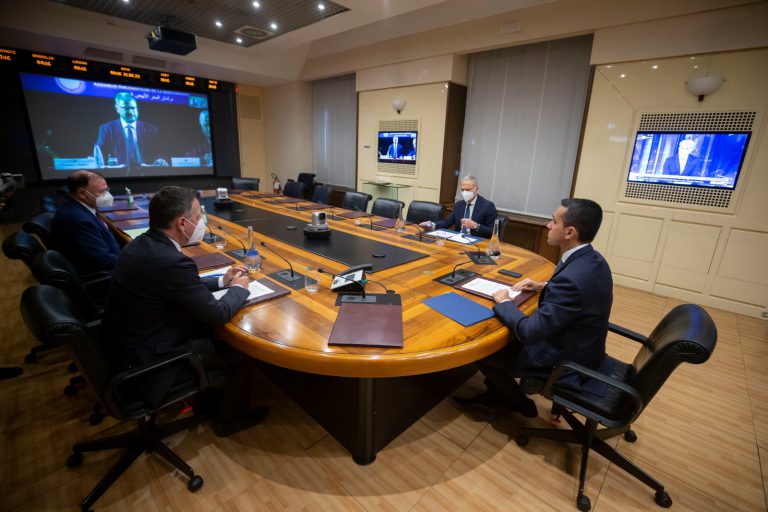“I believe that the offensive launched by Turkey against ISIS in northern Syria is important. The risk of Ankara’s involvement in the anti-Daesh [ISIS, editor’s note] coalition overlapping with the internal dynamics of the Kurdish question has existed for months. The Turkish authorities have not only reacted to the Daesh attacks but also granted the U.S. use of the Incirlik base for military operations against the caliphate. This is an unprecedented move of major tactical and political significance”. Paolo Gentiloni discussed the Greater Middle East following the Iranian nuclear agreement and in the midst of a critical transition in Libya, where the hopes being fuelled by UN mediation’s initial progress are intertwined with the emergency due to the abduction of four Italian technical workers.
“I am sure”, the minister for foreign affairs says, “that anyone working to bring the four abducted men back, from the Farnesina to the intelligence services, will not be distracted by an overabundance of theories, claims and intrigue. Efforts must be carried out with the maximum confidentiality, which is already true in this case as it has been in other older ones. The second anniversary of the abduction in Syria of Father Dall’Oglio is approaching, and we have not forgotten him”.
The political situation in Libya is evolving. What will the next steps be?
«Bernardino Leon’s negotiations have reached a decisive stage. The framework of understanding has been signed by a significant majority of actors: Tobruk, Misurata, Zintane and a considerable portion of the militias, tribes and municipalities, including some of the Tripoli factions, parties. Efforts are now needed to allow the participation of the General National Congress of Tripoli, given the pressure on it and threats coming from extremist components. Those insisting on extremist positions will be met with a harsh response form the international community in terms of isolation and individual sanctions; and if this continues, it will come time for the Libyan Central Bank to collaborate, cutting the funding, which it now distributes to all, for those who oppose the process ».
The Iranian nuclear deal is already creating political and economic dynamics. “To Teheran, to Teheran” is the password in Western capitals. Are we in the running as well?
«Italy has 60 years of being in the running with Teheran, beginning with Enrico Mattei, it is nothing new. I think the deal, if implemented in all its various parts, has the potential for being considered historic, and will also allow for a somewhat different assessment of the Obama presidency, which has thus far perhaps been underestimated. To its credit it is positive for what it has avoided: the risk of nuclear escalation and military in the region; and it is positive for the potential it has created both on the Iranian domestic plane, and in terms of balance in the region, where Iran’s involvement is pivotal».
You will be going to Teheran on 4 August. Is system Italy equipped to meet the challenge?
«A great nation, with major market potential and a diversified society is about to open up, not some years from now but in a few months, when the financial and economic sanctions are lifted. For our firms, some of which will accompany us in August while others will go over on a second mission in October, this is an opportunity not to be missed. Our message to Iran is that Italy has been a reliable and consistent partner for decades and that Italian quality can return to having a prominent role».
Why should the deal ensure Israeli security, which instead is denouncing it as an historic mistake?
«This deal makes it impossible to transform Iranian nuclear capacity from civilian to military not for 10 or 15 years, but for always, naturally unless Teheran were to exit the non-proliferation treaty. I respect Israel’s concerns, but without this deal the risks would be enormous».
On Monday you will be receiving ambassadors of Italy from around the world. What approach will you recommend to your diplomats?
«This will be an opportunity for me, but also for the President and Prime Minister of the Republic, to meet with the heads of our foreign missions, which do not constitute a service but an intelligent and proactive network. It is not true that globalisation and facilitated communications in the digital era have reduced the role of diplomatic missions. Reality tells us the opposite, pointing to economic and cultural diplomacy and the need for leadership in security policy».
But is that not in contradiction with the budget cuts the Farnesina has undergone in recent years?
«I think that the government is aware of the importance of investing in what Hillary Clinton has called the “three d’s”: defence, diplomacy and development. If we realise that foreign policy has become fundamental to many of our domestic economic, security, immigration and cultural concerns, it follows that weakening this instrument will lead to serious risks for the country, while strengthening it and its quality offers major opportunities».


